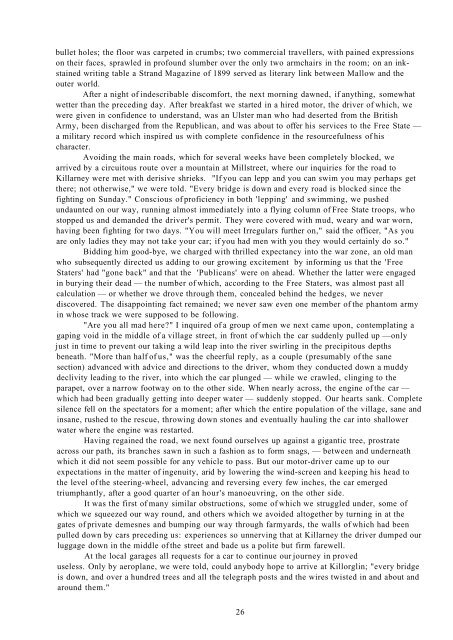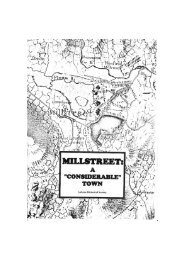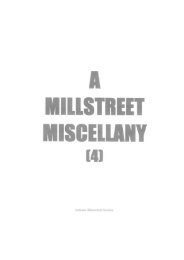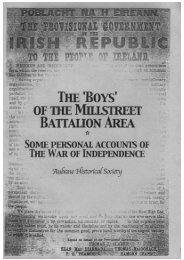A Millstreet Miscellany (3) - Aubane Historical Society
A Millstreet Miscellany (3) - Aubane Historical Society
A Millstreet Miscellany (3) - Aubane Historical Society
Create successful ePaper yourself
Turn your PDF publications into a flip-book with our unique Google optimized e-Paper software.
ullet holes; the floor was carpeted in crumbs; two commercial travellers, with pained expressions<br />
on their faces, sprawled in profound slumber over the only two armchairs in the room; on an inkstained<br />
writing table a Strand Magazine of 1899 served as literary link between Mallow and the<br />
outer world.<br />
After a night of indescribable discomfort, the next morning dawned, if anything, somewhat<br />
wetter than the preceding day. After breakfast we started in a hired motor, the driver of which, we<br />
were given in confidence to understand, was an Ulster man who had deserted from the British<br />
Army, been discharged from the Republican, and was about to offer his services to the Free State —<br />
a military record which inspired us with complete confidence in the resourcefulness of his<br />
character.<br />
Avoiding the main roads, which for several weeks have been completely blocked, we<br />
arrived by a circuitous route over a mountain at <strong>Millstreet</strong>, where our inquiries for the road to<br />
Killarney were met with derisive shrieks. "If you can lepp and you can swim you may perhaps get<br />
there; not otherwise," we were told. "Every bridge is down and every road is blocked since the<br />
fighting on Sunday." Conscious of proficiency in both 'lepping' and swimming, we pushed<br />
undaunted on our way, running almost immediately into a flying column of Free State troops, who<br />
stopped us and demanded the driver's permit. They were covered with mud, weary and war worn,<br />
having been fighting for two days. "You will meet Irregulars further on," said the officer, "As you<br />
are only ladies they may not take your car; if you had men with you they would certainly do so."<br />
Bidding him good-bye, we charged with thrilled expectancy into the war zone, an old man<br />
who subsequently directed us adding to our growing excitement by informing us that the 'Free<br />
Staters' had "gone back" and that the 'Publicans' were on ahead. Whether the latter were engaged<br />
in burying their dead — the number of which, according to the Free Staters, was almost past all<br />
calculation — or whether we drove through them, concealed behind the hedges, we never<br />
discovered. The disappointing fact remained; we never saw even one member of the phantom army<br />
in whose track we were supposed to be following.<br />
"Are you all mad here?" I inquired of a group of men we next came upon, contemplating a<br />
gaping void in the middle of a village street, in front of which the car suddenly pulled up —only<br />
just in time to prevent our taking a wild leap into the river swirling in the precipitous depths<br />
beneath. "More than half of us," was the cheerful reply, as a couple (presumably of the sane<br />
section) advanced with advice and directions to the driver, whom they conducted down a muddy<br />
declivity leading to the river, into which the car plunged — while we crawled, clinging to the<br />
parapet, over a narrow footway on to the other side. When nearly across, the engine of the car —<br />
which had been gradually getting into deeper water — suddenly stopped. Our hearts sank. Complete<br />
silence fell on the spectators for a moment; after which the entire population of the village, sane and<br />
insane, rushed to the rescue, throwing down stones and eventually hauling the car into shallower<br />
water where the engine was restarted.<br />
Having regained the road, we next found ourselves up against a gigantic tree, prostrate<br />
across our path, its branches sawn in such a fashion as to form snags, — between and underneath<br />
which it did not seem possible for any vehicle to pass. But our motor-driver came up to our<br />
expectations in the matter of ingenuity, arid by lowering the wind-screen and keeping his head to<br />
the level of the steering-wheel, advancing and reversing every few inches, the car emerged<br />
triumphantly, after a good quarter of an hour's manoeuvring, on the other side.<br />
It was the first of many similar obstructions, some of which we struggled under, some of<br />
which we squeezed our way round, and others which we avoided altogether by turning in at the<br />
gates of private demesnes and bumping our way through farmyards, the walls of which had been<br />
pulled down by cars preceding us: experiences so unnerving that at Killarney the driver dumped our<br />
luggage down in the middle of the street and bade us a polite but firm farewell.<br />
At the local garages all requests for a car to continue our journey in proved<br />
useless. Only by aeroplane, we were told, could anybody hope to arrive at Killorglin; "every bridge<br />
is down, and over a hundred trees and all the telegraph posts and the wires twisted in and about and<br />
around them."<br />
26





